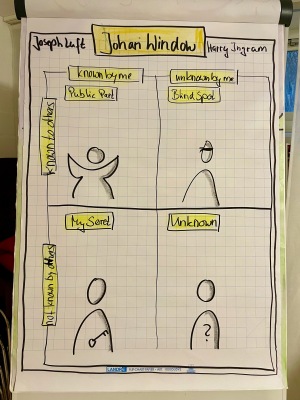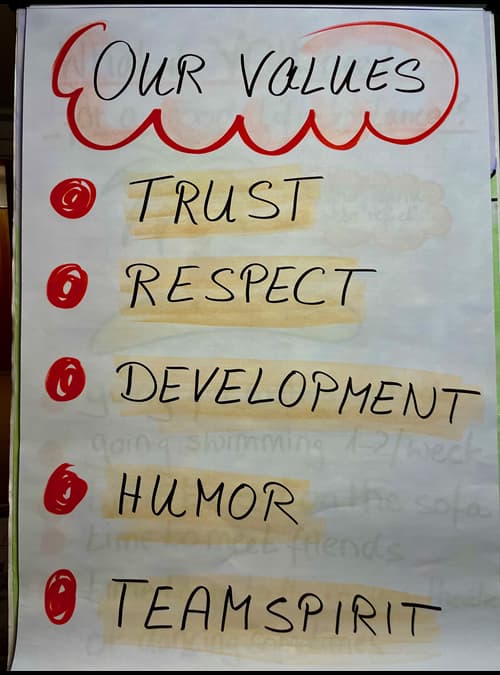Conflict management in Berlin & Brandenburg
Mediation & conflict moderation – for teams & managers
- Are misunderstandings costing you and your team time and nerves?
- Conflicts affect motivation, cooperation and enjoyment of work?
- Absenteeism, tensions and declining employee loyalty are the result?
There are opportunities in conflicts
Conflicts are not just disruptions – they also offer opportunities. When team discussions or traditional workshops are no longer enough, professional conflict management through mediation or conflict moderation can make all the difference. In a confidential setting – at your premises, at my office in Berlin-Zehlendorf or online – I will help you to resolve tensions, change perspectives and develop sustainable solutions – individually, respectfully and constructively.

I support you in a wide variety of contexts – whether in companies, research institutes, law firms, clinics, daycare centers, NGOs or social institutions. I work in a solution-oriented manner and with an eye for systemic contexts, also interculturally if desired.
Even in highly escalated situations, I will lead the discussion and, if necessary, work with you to develop suitable steps for team development and prevention, e.g. by promoting a culture of feedback.
Examples of conflicts in the workplace
Conflicts in everyday working life are human – wherever different points of view and needs clash. If they remain unspoken, they put a strain on collaboration and cooperation. Professional conflict management makes sense here.
Typical examples from the world of work – often related to “our blind spots”:
- Unclear roles & responsibilities: Who does what – and who doesn’t? Lack of clarity quickly leads to frustration.
- Communication problems: Misunderstandings, a lack of feedback or a sharp tone undermine trust.
- Unevenly distributed workload: If individuals feel permanently overwhelmed, tensions arise in the team.
- Management behavior: Employees do not feel listened to or sufficiently supported.
- Conflicting values: Different ideas of reliability, speed or responsibility lead to friction.
- Hidden tensions: It is not talked about openly, but the climate is noticeably strained.
- Changes in the company: New structures or managers trigger uncertainty or resistance.
- Cultural differences: Different communication styles can lead to misunderstandings.

Conflicts cost energy – and they hold potential for development
I would be happy to support you and your team in resolving tensions and creating a trusting working relationship.
I have been offering conflict management in Berlin and Brandenburg for almost 20 years – professionally, sensitively and solution-oriented. Depending on your needs, I work in person or online. In addition to my own room in Steglitz-Zehlendorf, I also have access to the premises of colleagues in other districts, such as Tempelhof-Schöneberg, Charlottenburg-Wilmersdorf, Friedrichshain-Kreuzberg, Mitte, Prenzlauer Berg, Neukölln, Pankow or Treptow-Köpenick, for personal meetings. This allows us to flexibly select a suitable location for our collaboration – either close to you or directly on your premises.
A concrete example: value conflicts

Values are reflected in our behavior, in our communication – and in the way we work together. They shape every corporate culture, but are often difficult to grasp. They become particularly tangible when tensions arise.
For example, when responsibility is perceived as control or trust turns into blind trust:
It takes a trusting framework and time to agree on common values – openly, respectfully and solution-oriented.
In mediation or conflict moderation, the team can work out together what is important to them and how these values can be practiced in everyday life. This turns a conflict into a development step. I have been supporting teams and managers for many years – even in highly escalated situations and intercultural contexts. I am always touched anew when understanding is achieved, all parties involved save face – and viable solutions are found.
Basic information on mediation and conflict moderation
Phase 1: Introduction and rules of conduct
At the beginning, the mediator provides information about the mediation process. Common rules of conduct such as “let each other finish speaking”, “no insults” and “listen carefully” are discussed. The mediator ensures a structured process and offers helpful interventions. A mediation contract can record the agreements.
Phase 2: Collecting issues
The mediator collects all of the parties’ conflict issues, e.g. on a flipchart. While the parties present their points of view, the mediator makes sure that everyone has enough time to listen and ask questions in order to cover all relevant topics.
Phase 3: Interests and needs
The aim of this phase is to understand the underlying needs, feelings and interests. The mediator helps to clarify misunderstandings and encourages direct communication. If necessary, individual discussions can take place to deepen the clarification.
Phase 4: Finding a solution
The mediants work together to develop proposed solutions. These are collected, discussed and evaluated in terms of their feasibility. The aim is to find a solution that all parties agree with.
Phase 5: Final agreement
At the end, there is a written agreement that is signed by all parties. If necessary, this can be checked or formulated by lawyers.
Conflict moderation is a structured process for resolving tensions in a work context. It combines systemic consulting with moderation elements and is based on the principle of impartiality – all parties involved are heard equally and taken seriously.
In addition to the structured process, mediation lives above all from its basic principles. They create trust, security and clarity for all parties involved:
1. confidentiality
Everything that is discussed in mediation remains confidential. The mediator and the parties involved undertake to maintain confidentiality.
2. voluntariness
Participation is voluntary – as is the right to end mediation at any time. The focus is on personal responsibility.
3. neutrality
The mediator remains impartial – he supports the process but does not take a position on the content.
4. personal responsibility
The parties to the conflict find their own solutions – the mediator accompanies them in the process without imposing guidelines.
5. transparency
Viable solutions can only be found if everyone is well informed.
6. openness to results
Mediation is not a process with fixed results – but a space in which new paths can emerge.
Conflict moderation is a structured process for resolving tensions in a work context. It combines systemic consulting with moderation elements and is based on the principle of impartiality – all parties involved are heard equally and taken seriously.
The aim is to clarify relationships, understand conflicts and develop viable solutions together on this basis.
Typical fields of application:
- Conflicts between two people (e.g. manager & employee)
- Team conflicts
- Tensions between different hierarchical levels (e.g. managers & employees)
Ideally, all participants take part voluntarily. In some cases – e.g. as part of an employment relationship – participation may also be mandatory.
Conclusion
Professional conflict management brings clarity, trust, and new solutions to strained working relationships—before cooperation is permanently impaired or leads to employee turnover.
You benefit from:
- rapid relief in acute conflicts – even in highly escalated situations
- neutral, professional facilitation with room for all perspectives
- the rebuilding of trust and sustainable communication
- concrete solutions for interpersonal tensions within the team
- effective handling of structural causes of conflict (e.g., roles, responsibilities, processes)
- an improved feedback and conflict culture within the team
- the strengthening of your leadership role through clear, solution-oriented support
- a combination of mediation, moderation, and a systemic perspective
- a high degree of flexibility: on-site, online, or in suitable rooms near you
What you might want to know...
1. When is the right time to make use of conflict moderation?
Often sooner than you think. If discussions are going round in circles, tensions are palpable in the team or conflicts are blocking work processes, it makes sense to call in external support - before fronts harden.
2. What exactly happens during conflict moderation?
I create a structured, protected framework in which everyone involved can have their say and contribute their views. The aim is to facilitate mutual understanding, make dynamics visible and develop viable agreements.
3. What is the difference between mediation and conflict moderation?
Mediation is a clearly structured, legally defined process with the aim of reaching a binding agreement. Conflict moderation is more open in its methodology and can also take place in more complex or organizational contexts - with a focus on clarification, understanding and cooperation.
4. Do I have to “reconcile” with the other person?
No, because it is not about harmony, but about professional and respectful interaction despite differing positions. The aim is to find a viable solution for the joint work.
5. What happens if someone does not participate voluntarily?
Voluntary participation is important. I clarify in advance whether everyone involved is willing to work together. If not, sometimes another form of clarification can be used.
6. How long does conflict mediation take?
This depends on the scope and depth of the conflict. In some cases, one or two appointments are sufficient, but more complex situations may require several steps. I work with a clear process that we coordinate together.
7. Is everything discussed openly? What about sensitive issues?
Everything that is said remains in the room. I pay attention to confidentiality and safe discussion rules. I also handle difficult topics with care and clarity - always with a view to what is helpful and solution-oriented.
8. What attitude do you bring to the table as a conflict moderator?
I am impartial, which means that I don't represent one side, but rather an understanding. I listen, sort and structure, and I can also withstand tensions in order to facilitate development. My actions are characterized by values such as respect, openness and reliability.
9. Who is conflict moderation suitable for?
For individuals, teams, managers or organizations who are looking for clarity in a tense situation and are prepared to take responsibility for their collaboration.
10. What does conflict moderation cost?
The costs depend on the scope of the assignment. After a non-binding preliminary discussion, I will prepare a transparent offer that is tailored to your questions and your setting.
